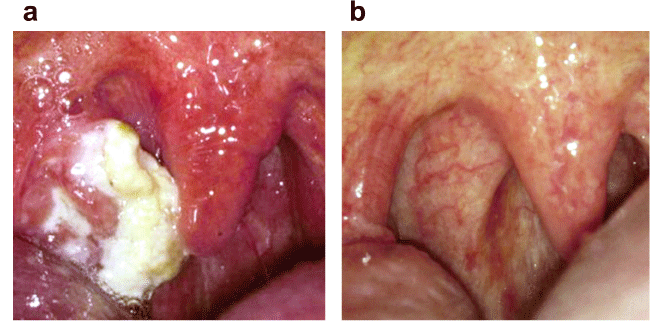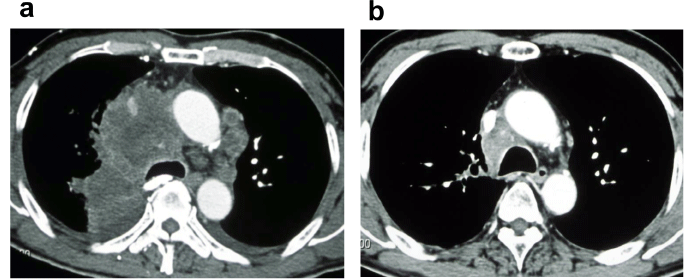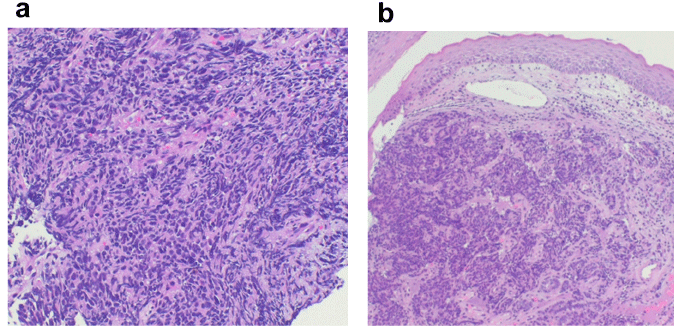Keywords
|
| Small cell lung cancer, Tonsillar metastasis, Chemotherapy, Complete response |
Introduction
|
| Metastatic palatine tonsil cancer is extremely rare, accounting for only 0.8% of all tonsillar tumors [1]. In a review of cases of primary neoplasms complicated by tonsillar metastases, there were few cases with primary lung cancer. We present a case of metastatic palatine tonsil cancer manifesting as an isolated right tonsillar mass derived from primary small cell lung cancer (SCLC), successfully treated with combination chemotherapy alone. |
Case Report
|
| A 64-year-old man with a 40-pack-per-year smoking history was referred to the institution complaining of progressive shortness of breath, persistent cough with blood-streaked mucus, and hoarseness that had begun two months previously. No odynophagia or dysphagia was reported. A physical examination revealed significant swelling of the face, neck, and upper limb, and a large ulcerated mass in the right palatine tonsil (Figure 1A). There were no palpable cervical lymph nodes. Computed tomography (CT) of the chest with contrast showed a huge right upper-lobe mass involving the right hilum and occlusion of the right main bronchus with enlargement of multiple mediastinal lymph nodes (Figure 2A). The primary tumor extended into the mediastinum, and there was external compression of the carina and narrowing of the superior vena cava (SVC). A bilateral venogram revealed complete occlusion of the SVC with associated collateral veins, indicative of SVC syndrome. The patient underwent bronchoscopy and biopsy of the right upper-lobe mass, which confirmed the presence of small cell lung cancer (SCLC) (Figure 3A). Biopsy of the tonsillar tumor was performed by the otorhinolaryngology department. Microscopic findings of the tumor showed a surface squamous epithelium with extensive infiltration of the tonsillar lamina propria by abundant atypical small round cells, and then the tumor was diagnosed as a metastasis from SCLC (Figure 3B). There were no pathological findings on abdominal CT, brain magnetic resonance imaging (MRI), or bone scintigraphy. The patient was diagnosed as an extensive-stage SCLC with isolated unitonsillar metastasis. Subsequently, the patient with chemotherapy-naïve SCLC received combination chemotherapy with carboplatin area-under-the-curve (AUC) 6 and etoposide 100 mg/m2 on days 1-3, every four weeks, because there were no apparent symptoms associated with the tonsillar metastasis and early tumor shrinkage might be expected. The symptoms due to SVC syndrome improved and shrinkage of a tonsillar tumor was obtained after one cycle of the chemotherapy. Following a total of four cycles of the chemotherapy, CT of the chest with contrast showed partial responses at the primary and locoregional sites, and blood flow of SVC markedly improved with a disappearance of the developed collateral veins (Figure 2B); on the other hand, the metastatic tonsillar tumor had completely resolved (Figure 1B). About one year later the patient died due to multiple brain metastases with deteriorations of the primary and locoregional lesions, but there had been no recurrence of tonsillar metastasis. |
Discussion
|
| We present a case of SCLC-derived metastatic palatine tonsil cancer manifesting as an isolated right tonsillar mass. The palatine tonsil is one of the most common sites of head and neck cancer and squamous cell carcinoma in adults [2] as well as lymphoma in children [3]. However, metastatic palatine tonsil cancer is extremely rare. To date, in the English-language literature, approximately 100 cases of cancers from various organs metastasizing to the palatine tonsil have been reported [4]. They include carcinoma of the breast, stomach, intestinal tract, kidney, skin and the lung. To the best of our knowledge, only 24 cases of lung cancer, mainly SCLC, have been reported to involve the tonsils, 22 the palatine and 2 the lingual tonsil [4-10]. It is well known that SCLC disseminates widely throughout the body at an early stage; the common metastatic sites are the brain, liver, bone, and adrenal glands, not tonsillar area. Interestingly, in the present case, there were no metastases to other distant organs except the right palatine tonsil at the initial diagnosis. This unusual pattern of SCLC metastasis distinguishes the present case from the others reported in the literature. |
| In the metastatic process, tonsillar involvement could either be a first station or part of widespread systematic distant metastases. The pathway by which malignant tumors metastasize to the tonsil remains to be elucidated. Hematogenous spread to the tonsil may occur through the systematic arterial blood flow passing through the lungs. On the other hand, lymphatic spread is also considered a potential mechanism. Metastasis of the palatine tonsil may occur as a result of retrograde movement of tumor cells through lymphatic vessels of the neck, either from the thoracic duct or from the veins of the neck, and from there to the tonsil itself, because the palatine tonsil does not have afferent lymphatic vessels [11]. In the present case, the route of metastasis to the right palatine tonsil is difficult to determine, since no evidence of metastasis to the distant organ, such as liver, brain, bone, and adrenal glands was observed and no cervical lymphadenopathy was palpated. |
| Most patients with tonsillar metastases are symptomatic, displaying difficulty in breathing, sore throat, dysphagia, odynophagia, otalgia and irritable cough accompanied with a foreign body-like sensation [12]. These symptoms are not specific to metastatic tonsillar cancer, but associated with tonsillitis caused by various pathogens or primary tonsil cancer. In the present case, however, there were no apparent symptoms associated with the tonsillar metastasis. It is possible that symptoms derived from SVC syndrome and airway stenosis might have made any tonsillar metastasis-associated symptoms less noticeable on initial examination. |
| For patients with extensive-stage SCLC, chemotherapy alone is the recommended treatment, although radiotherapy may be used in select patients for palliation of symptoms. Regarding primary squamous cell carcinoma of the tonsils, radiotherapy is as effective as surgery in controlling the tumor [13]. Although the efficacy of radiotherapy for metastatic tonsillar cancers has not been clearly verified, there are some reports that demonstrate a favorable response to radiotherapy [14] or combined chemoradiotherapy [15]. The beneficial effects of radiotherapy on patients with metastatic tonsillar cancers remain to be elucidated. In the present case, the metastatic tonsillar tumor was completely resolved by combination chemotherapy with carboplatin and etoposide. However, this combination chemotherapy to primary and locoregional sites resulted in a partial response of the tumor. Intertumoral heterogeneity may account for these differences in the antitumor effect of chemotherapy between the primary site and the distant metastatic lesion. In addition, because the palatine tonsil is rich in vasculature, chemotherapeutic agents may have been more highly distributed in the tonsils than at the primary and locoregional sites. |
Conclusion
|
| We describe a case of SCLC with isolated unitonsillar metastasis successfully treated with combination chemotherapy alone. Although such an extremely unusual metastasis may be a pitfall for clinicians, an early definitive diagnosis followed by multidisciplinary treatments including intensive chemotherapy can lead to improved prognoses of patients with extensive-stage SCLC. |
Figures at a glance
|
 |
 |
 |
| Figure 1 |
Figure 2 |
Figure 3 |
|
| |
| |








